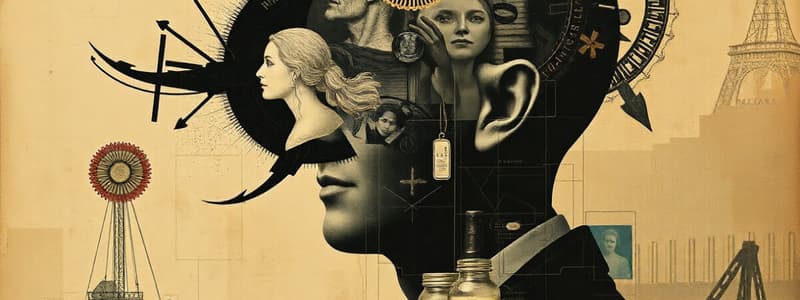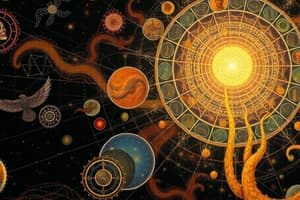Podcast
Questions and Answers
What is the primary focus of psychology as a discipline?
What is the primary focus of psychology as a discipline?
- Study animal behavior
- Control human behavior
- Examine human behavior and mental processes (correct)
- Understand natural phenomena
Which archetype is associated with the mask that individuals present to the world?
Which archetype is associated with the mask that individuals present to the world?
- Shadow
- Persona (correct)
- Hero
- Anima
What does Carl Jung's concept of the collective unconscious entail?
What does Carl Jung's concept of the collective unconscious entail?
- Ideas that influence all human lives universally (correct)
- Genetic predispositions to certain behaviors
- Shared memories of our immediate family
- Personal experiences unique to each individual
Which term refers to the irrational mood and feeling associated with the feminine side of men?
Which term refers to the irrational mood and feeling associated with the feminine side of men?
What is the significance of the 'self' in William James's theory of self?
What is the significance of the 'self' in William James's theory of self?
What encompasses the components of the 'Me self' as proposed by William James?
What encompasses the components of the 'Me self' as proposed by William James?
Which archetype symbolizes wisdom and the mysteries of life?
Which archetype symbolizes wisdom and the mysteries of life?
What does the term 'shadow' refer to in Jung's theories?
What does the term 'shadow' refer to in Jung's theories?
Which statement about the nature-nurture controversy is correct?
Which statement about the nature-nurture controversy is correct?
What does the 'hero archetype' signify in Jungian psychology?
What does the 'hero archetype' signify in Jungian psychology?
What does the spiritual self represent in psychology?
What does the spiritual self represent in psychology?
In Carl Rogers' theory, what does the ideal self refer to?
In Carl Rogers' theory, what does the ideal self refer to?
According to self-discrepancy theory, what is compared?
According to self-discrepancy theory, what is compared?
What concept did Murray Bowen introduce that involves freeing oneself from familial expectations?
What concept did Murray Bowen introduce that involves freeing oneself from familial expectations?
What does self-efficacy refer to in the context of human agency?
What does self-efficacy refer to in the context of human agency?
Which aspect of human agency involves a person's ability to intentionally regulate their behavior?
Which aspect of human agency involves a person's ability to intentionally regulate their behavior?
What does the false self represent according to Donald Woods Winnicott?
What does the false self represent according to Donald Woods Winnicott?
What is the first feature of human agency as defined in the content?
What is the first feature of human agency as defined in the content?
What defines the actual self in the context of self-concept?
What defines the actual self in the context of self-concept?
What is the significance of modeling in social cognitive theory?
What is the significance of modeling in social cognitive theory?
Flashcards
Psychology
Psychology
The study of human behavior and mental processes.
Nature-Nurture Controversy
Nature-Nurture Controversy
The debate on whether genes (nature) or environment (nurture) more influence behavior.
Collective Unconscious
Collective Unconscious
Shared unconscious ideas and concepts in human beings.
Archetypes
Archetypes
Signup and view all the flashcards
Persona
Persona
Signup and view all the flashcards
Shadow
Shadow
Signup and view all the flashcards
Anima
Anima
Signup and view all the flashcards
Animus
Animus
Signup and view all the flashcards
Material Self
Material Self
Signup and view all the flashcards
Social Self
Social Self
Signup and view all the flashcards
Spiritual Self
Spiritual Self
Signup and view all the flashcards
Global Self
Global Self
Signup and view all the flashcards
Self-Differentiation
Self-Differentiation
Signup and view all the flashcards
Self-Concept
Self-Concept
Signup and view all the flashcards
Real Self
Real Self
Signup and view all the flashcards
Ideal Self
Ideal Self
Signup and view all the flashcards
Self-Efficacy
Self-Efficacy
Signup and view all the flashcards
True Self
True Self
Signup and view all the flashcards
False Self
False Self
Signup and view all the flashcards
Self-Reactive
Self-Reactive
Signup and view all the flashcards
Study Notes
Understanding the Self - Lesson 4
- Psyche/Soul: Psychology studies human behavior and mental processes.
- 4 Goals of Psychology: Describe, explain, predict, and control human behavior.
- Nature-Nurture Controversy: Both nature (genetics) and nurture (environment/social interactions) influence behavior.
- Feminine Side of Men (Animus): Men have illogical opinions and irrational thinking.
- Masculine Side of Women (Anima): Archetypes of fertility and destruction, wisdom and meaning.
- Archetypes: Symbolic pre-existing knowledge and mysteries in life (example: hero, wise old man, great mother).
- Self: Highest form of archetype; represents wholeness and completeness of the individual.
Carl Gustav Jung
- Father of Analytical Psychology: Assumes certain phenomena or situations influence everyone's lives
- Collective Unconscious: A part of the unconscious mind containing universal ideas.
- Archetypes: Ancient images/symbols from the collective unconscious (persona, shadow, anima, animus).
William James
- Father of American Psychology: Developed the theory of self.
- I-Self (Pure Ego): Self that recognizes who you are and what you've done.
- Me-Self (Empirical Self): The self as a separate entity that the person reflects on in situations and experiences.
3 Components of Me-Self
- Material Self: Possessions/physical objects.
- Social Self: How individuals interact with others.
- Spiritual Self: Highest aspect of self, state of peace.
Other Topics (Lesson 5 and other pages)
- Self-Differentiation: Freeing oneself from family expectations.
- Real and Ideal Self-Concepts (Rogers): Person's understanding of self; how a person thinks about themselves.
- Self-Efficacy (Bandura): Belief in one's ability to succeed.
- Self-Regulation: Monitoring/judging behavior.
- Individualism and Collectivism (Lesson 5): Independent vs. group-oriented values.
- Ecological Self (Lesson 5): Considering the non-human environment.
- Confucianism: Ethical philosophy focusing on wholeness (Ren), proper conduct (Li), respect for elders (Xiao), and justice (Yi).
Studying That Suits You
Use AI to generate personalized quizzes and flashcards to suit your learning preferences.




